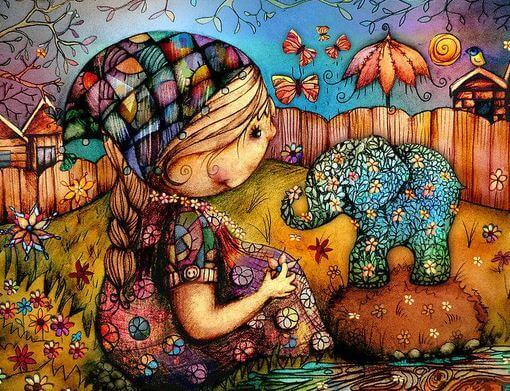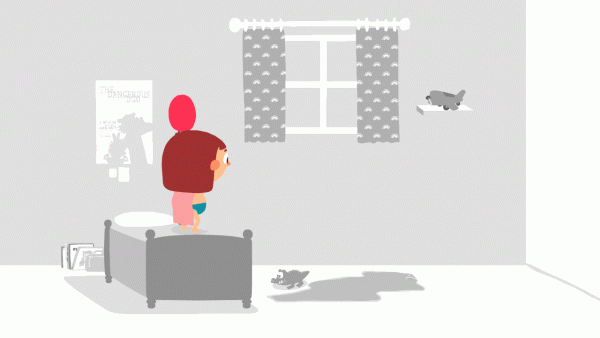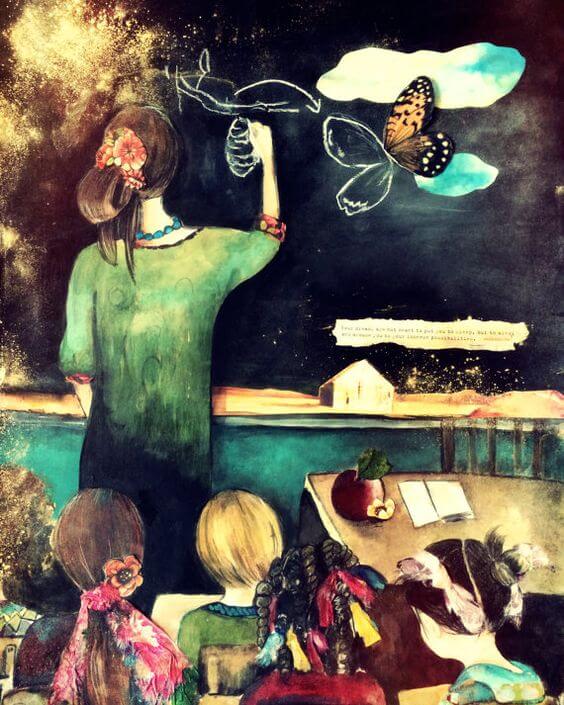Healthy Children Are Spontaneous, Noisy, Emotional, and Colorful

Children weren’t born to stay quiet, to not touch things, to be patient, or to entertain themselves. Children weren’t born to remain seated, watching television or playing on a tablet. They don’t want to be quiet all the time.
They need to move, explore, find new things, create adventures, and discover the world around them. They’re learners, sponges, natural players, treasure seekers, powerful earthquakes.
Children are free, pure souls who want to fly, not stand to the side or be chained down. Let’s not turn them into slaves of adult life, always hurrying and lacking imagination, the way the current adult generation is.
Let’s not imprison them in our world of disenchantment. Let’s encourage their capacity for wonder and guarantee them an emotional, social, and cognitive world rich in stimuli, in the smell of flowers, in sensory expression, in happiness and knowledge.

What happens in the brain of a child at play?
The benefits of playing at all levels (physiological, emotional, behavioral, and cognitive) are not a mystery. In fact, we know of many interconnected effects of playing:
- It regulates their mood and anxiety.
- It promotes attention, learning, and memory.
- It reduces neurological tension and promotes calm, well-being, and happiness.
- It increases physical motivation as their muscles move and push them to play.
- It favors imagination and creativity, helping them to create fantasy around them.
Society has encouraged hyper-parenting, or parental obsession over their children gaining specific abilities that will guarantee them a good job in the future. We forget, as a society and as educators, that children are worth more than their grades, and when we insist on prioritizing results, we’re neglecting their life skills.
Our little children need us to love them, not because of their achievements and failures, but rather for being themselves, unique by nature. As children, we’re not responsible for how we’re raised, but as adults we’re completely responsible for fixing it.

Keep childhood simple
We always say that everyone is unique, but it doesn’t seem like we’ve really internalized it. This is reflected in the simple fact that we’ve established a set of rules to follow to raise all children.
This is a huge mistake, and it doesn’t agree at all with the idea that everyone is unique. Therefore, it’s not surprising that our beliefs and our actions are in constant conflict when we raise children.
Also, like professor and counselor Kim Payne has stated, we’re raising our children with:
- too much information.
- too many material things.
- too many options.
- too much haste.
We’re preventing them from exploring, reflecting, and freeing themselves of the tensions of daily life. We’re cramming them with technology, toys, and school and extracurricular activities. We’re distorting their childhood, and even worse, we’re preventing them from playing and developing.
Today, children spend less time in the fresh air than people in prison. Why? Because we keep them “entertained and occupied” with other activities that we deem as more necessary, trying to keep them pristine and not stained with mud. This is unacceptable and extremely worrying. Let’s look at a few reasons why we should change this:
- Excessive hygiene increases their chances of developing allergies, as demonstrated by a study done by Gothenburg Hospital in Sweden.
- Not letting them enjoy fresh air is a form of torture that locks up their creative and developmental potential.
- Staying glued to their cellphones, tablets, computers, or television screens is highly damaging cognitively, emotionally, physiologically, and behaviorally.

We could go on, but at this point I think that most of has have already found countless examples of how we destroy the magic of childhood. As educator Francesco Tonucci said:
“Children’s experiences should feed their education: their lives, their surprises, their discoveries. My teacher always made us empty our pockets in class, because they were full of evidence of the outside world: bugs, strings, cards, jacks… But today we should do the opposite, we should ask them to show us what they carry in their pockets. That way, school opens up to life, receiving children with the knowledge that they have and working around it.”
This is, without a doubt, a much healthier way to work with them, to raise them, and to guarantee their success.
Children weren’t born to stay quiet, to not touch things, to be patient, or to entertain themselves. Children weren’t born to remain seated, watching television or playing on a tablet. They don’t want to be quiet all the time.
They need to move, explore, find new things, create adventures, and discover the world around them. They’re learners, sponges, natural players, treasure seekers, powerful earthquakes.
Children are free, pure souls who want to fly, not stand to the side or be chained down. Let’s not turn them into slaves of adult life, always hurrying and lacking imagination, the way the current adult generation is.
Let’s not imprison them in our world of disenchantment. Let’s encourage their capacity for wonder and guarantee them an emotional, social, and cognitive world rich in stimuli, in the smell of flowers, in sensory expression, in happiness and knowledge.

What happens in the brain of a child at play?
The benefits of playing at all levels (physiological, emotional, behavioral, and cognitive) are not a mystery. In fact, we know of many interconnected effects of playing:
- It regulates their mood and anxiety.
- It promotes attention, learning, and memory.
- It reduces neurological tension and promotes calm, well-being, and happiness.
- It increases physical motivation as their muscles move and push them to play.
- It favors imagination and creativity, helping them to create fantasy around them.
Society has encouraged hyper-parenting, or parental obsession over their children gaining specific abilities that will guarantee them a good job in the future. We forget, as a society and as educators, that children are worth more than their grades, and when we insist on prioritizing results, we’re neglecting their life skills.
Our little children need us to love them, not because of their achievements and failures, but rather for being themselves, unique by nature. As children, we’re not responsible for how we’re raised, but as adults we’re completely responsible for fixing it.

Keep childhood simple
We always say that everyone is unique, but it doesn’t seem like we’ve really internalized it. This is reflected in the simple fact that we’ve established a set of rules to follow to raise all children.
This is a huge mistake, and it doesn’t agree at all with the idea that everyone is unique. Therefore, it’s not surprising that our beliefs and our actions are in constant conflict when we raise children.
Also, like professor and counselor Kim Payne has stated, we’re raising our children with:
- too much information.
- too many material things.
- too many options.
- too much haste.
We’re preventing them from exploring, reflecting, and freeing themselves of the tensions of daily life. We’re cramming them with technology, toys, and school and extracurricular activities. We’re distorting their childhood, and even worse, we’re preventing them from playing and developing.
Today, children spend less time in the fresh air than people in prison. Why? Because we keep them “entertained and occupied” with other activities that we deem as more necessary, trying to keep them pristine and not stained with mud. This is unacceptable and extremely worrying. Let’s look at a few reasons why we should change this:
- Excessive hygiene increases their chances of developing allergies, as demonstrated by a study done by Gothenburg Hospital in Sweden.
- Not letting them enjoy fresh air is a form of torture that locks up their creative and developmental potential.
- Staying glued to their cellphones, tablets, computers, or television screens is highly damaging cognitively, emotionally, physiologically, and behaviorally.

We could go on, but at this point I think that most of has have already found countless examples of how we destroy the magic of childhood. As educator Francesco Tonucci said:
“Children’s experiences should feed their education: their lives, their surprises, their discoveries. My teacher always made us empty our pockets in class, because they were full of evidence of the outside world: bugs, strings, cards, jacks… But today we should do the opposite, we should ask them to show us what they carry in their pockets. That way, school opens up to life, receiving children with the knowledge that they have and working around it.”
This is, without a doubt, a much healthier way to work with them, to raise them, and to guarantee their success.
This text is provided for informational purposes only and does not replace consultation with a professional. If in doubt, consult your specialist.







